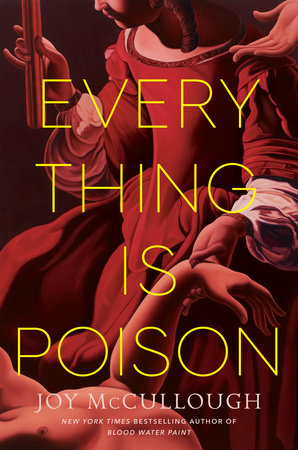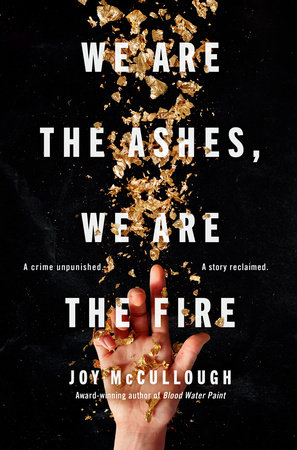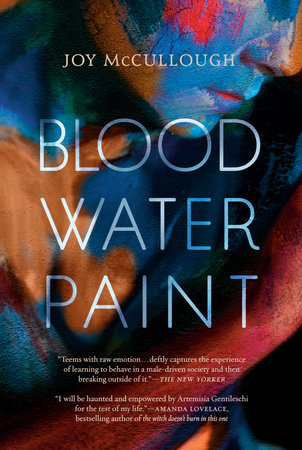
Enter the Body
Paperback
$12.99
In the room beneath a stage's trapdoor, Shakespeare’s dead teenage girls compare their experiences and retell the stories of their lives, their loves, and their fates in their own words. Bestselling author Joy McCullough offers a brilliant testament to how young women can support each other and reclaim their stories in the aftermath of trauma.
- Pages: 336 Pages
- Publisher: Penguin Young Readers Group
- Imprint: Dutton Books for Young Readers
- ISBN: 9780593406779
An Excerpt From
Enter the Body
(The trap room beneath all the stages, anywhere. The ghost light is perpetually on, but it illuminates very little. Which makes it easier to keep to oneself.
That woman with blood on her hands, for example, always wanders into the same corner, every time she crashes through that great stage of fools to this space beneath. Muttering to herself, but never to anyone else.
The one in the nightgown with strangle marks around her neck—-clutching a handkerchief like it’ll save her from these men, these men—-she usually heads to a corner too, after the fall. But only because she doesn’t know what else to do.
It’s a room, but there are infinite corners.
Enough for everyone to avoid the zealot in singed armor who reeks of the fire that burned her. Or the wild--eyed queen who looks as though she died a dozen deaths before she drank the poison that brought her here. The sisters who killed one another definitely need their own corners.
They crash through, again and again, these women, while the boards above their heads creak with the trodding of the ones who live, or die in glory.
It gets to be monotonous.
But now comes a girl the others aren’t accustomed to. It’s not that she hasn’t been down here before. In fact, she arrived before the rest of them, a violent splotch of ink from the quill of the Bard so young he hadn’t yet mastered his instrument. She is the first draft to his later masterpieces; without her they don’t exist. And yet they can be forgiven for not remembering her; the moment they see her, they do their level bests to shove her from their minds.
You would too. Only I won’t let you.
The jolt this first--draft girl receives when her body crumples to the ground is the least of her concerns. Those concerns are pretty evenly tied between the blood that gushes from her mouth, and also from the end of each arm, where hands should be. But hands are not.
She doesn’t even bother uncrumpling. What would be the point?
But there’s one woman under this stage compelled to help her, one who has known violence herself and is young enough to remember, while old enough to imagine herself maternal, even if she never survives to bear a child. This maternal one—-in a flimsy nightgown that is by design transparent when stage lights hit it exactly right—-approaches the bloody heap.
She strokes the girl’s hair, soothes the frightened creature until she looks up. The woman startles; for a moment she’s not certain whether this girl is prey or predator. Perhaps she is covered in someone else’s blood?
She is—-but not at her choosing. And her lack of hands offers irrefutable evidence that the girl herself has been on the receiving end of some significant evil.
The woman brings forth her handkerchief, the one that causes her such endless trouble on the stage above; she might as well put it to productive use while she has the chance.
It’s a ridiculous thing, flimsy as her nightdress and no match for the ghastly amounts of blood streaming down the girl’s face. But wielded by one who wishes to be of use, it somehow does what it is meant to do.
The girl is still wrecked; that cannot be undone. But she is no longer a horror show. And after everything she’s been through, the miracle is not that she lives, but that she does not want to be alone. She still craves company. She resists the corners.
This girl, her name is Lavinia. Names are important, even if no one says them. Let’s say she’s nineteen. She considers her options. The woman with the handkerchief has already retreated. The women in the corners are there for a reason.
There are other girls who want nothing to do with corners, though. Cordelia, seventeen, sits in the center of it all. Bedraggled, she’s clearly been through some shit, but it’s more important than anything that she keep it together, that you not see the struggle.
And nearby, another girl. Ophelia, fifteen, is soaking wet. Absolutely drenched. There may be a few leaves in her hair.
Lavinia watches these girls—-calligraphy to her splotch of ink—-who resist the corners. They see her, but their gazes glance off her. They are shoving her from their minds, like I said they would. In fairness, they both have a lot going on, even if they aren’t missing appendages.
Ophelia is not okay, but she’s not trying to conceal it. She is soaking wet, after all. It’s pretty hard to hide that something has gone awry. She doesn’t just walk around like this, normally, with pond scum clinging to her dress. This is not usual, except for every time the water drags her down and she crashes into this purgatory.
Cordelia is used to ignoring Ophelia. But now this third girl is here. Watching. Disturbing the norms of the trap room. Cordelia thought she was alone. She’s used to being alone. Her own sisters are there, each in their own corners, and even they don’t glance toward her. It’s not that Cordelia likes it this way; it’s just the only way it’s ever been, even up above, and how on earth is she supposed to adjust to something new at this point?
Anyway.
Here they are. For a while. Time doesn’t mean much in this place. They’ve just arrived, or maybe they’ve languished for an eternity, when Juliet crashes through.
Juliet, age thirteen, is also not okay. This is evidenced by the dagger in her heart. She’s making a big production of it too. Even Cordelia can’t look away as the girl wrenches the dagger from her chest and makes a show of figuring out where to put it. Like it matters.
Ophelia considers approaching her, helping her. She’s not sure how, or if she’s allowed, as though there are rules here. But when your world has been composed entirely of rules—-rules that landed you here, in fact—-it’s a difficult adjustment.
Lavinia flinches at the sight of the dagger. She’s safe now—-at least until she’s called back up and it starts all over again—-but logic is nothing against her memories of what a blade can do. Anyway, it’s not like she could help; she doesn’t have hands.
Cordelia works hard to act as though the others aren’t there. She has had enough of dramatic, bleeding girls to last a lifetime. Or an eternity, as it were.
Once Juliet figures out the dagger situation—-all she has to do is release it and it’s gone, which is a lesson that might have been valuable to learn sooner, but what this eternity has no time for is regret—-her gaze lands on Lavinia.
And then darts away—-I told you it would—-and searches desperately for something else, someone else to latch on to. It’s harder for Juliet to shove Lavinia from her mind. Perhaps it’s their shared experience with daggers. Perhaps it’s her youth. She would have nightmares, if sleep were permitted here.
Ophelia allows her eye to be caught. She understands Juliet’s panic and glances apologetically toward Cordelia, as though it’s her fault this other girl won’t acknowledge their presence.
Juliet isn’t bothered. It won’t be the first time she’s been required to wrest attention from the unwilling.)
a rose by any other name
You think me weak
that I would plunge
a blade into my heart
because the boy I loved
lay lifeless at my side.
But love is weakness.
Love is ripping out
your beating heart, laid bare
to the slings and arrows
of outrageous fortune.
Or maybe that vulnerability
is a kind of strength.
Hard to say
while the blood
drains from my body.









